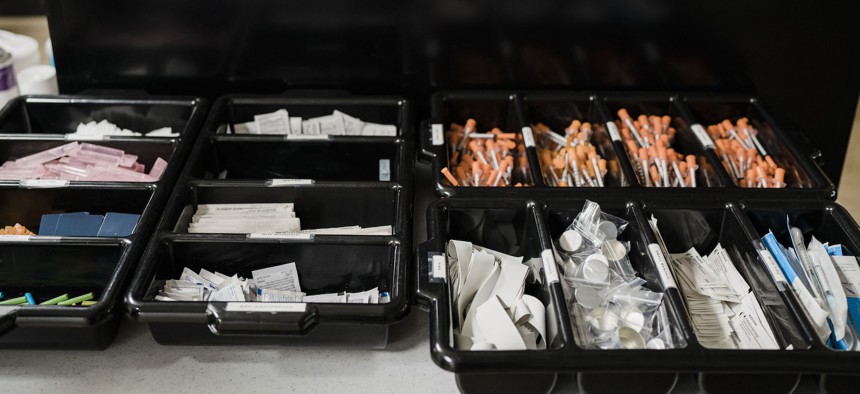NYC health department publishes first guidelines for supervised injection sites

OnPoint operates two supervised injection sites in New York City. Kent Nishimura / Los Angeles Times via Getty Images
The guidance further formalizes the sites, which are federally illegal.
With no official state or federal regulations on the operation of supervised injection sites in New York City, the city Department of Health and Mental Hygiene has issued a new series of guidelines for current and future operators to follow. It includes rules for training, community engagement, staffing and eligibility. The guidance is the first of its kind since the city approved the opening of the nation’s first two supervised injection sites in late 2021.
The addiction services nonprofit OnPoint NYC runs two supervised injection sites in New York City, places where people can use pre-obtained drugs such as heroin and cocaine under the supervision of professionals trained to prevent or reverse overdoses. Because such sites are still technically illegal under both federal and state law, they operate in a legal gray area with the cooperation of the city and police. But U.S. Attorney Damian Williams last month seemed to indicate that the federal policy of noninterference may change in the absence of official regulations. Gov. Kathy Hochul has not publicly supported the sites, and her administration has not signed off on the use of opioid settlement fund money to run them.
The new guidelines apply to the two sites already in operation and to any that hope to open in the future. The first guidance relates to eligibility, stating that an operator must first be registered with the state Department of Health’s syringe exchange program, and should actively collaborate with the city to establish site policies, create a community engagement plan and comply with data collecting recommendations. The guidance also set standards for emergency response equipment the site should have, such as the overdose reversal drug naloxone, oxygen and a defibrillator, and standards for staffing, including having a medical lead with some form of formal medical certification. The guidelines stipulate that there should always be at least one overdose prevention specialist for every four program participants at a time.
The guidelines also seek to address community concerns surrounding supervised injection sites. Although data supports the idea that the sites help reduce overdose deaths, they remain controversial in the communities in which they are located in the city due to safety concerns over increased drug activity surrounding the locations. The guidance stipulates that a supervised injection site should have a designated community manager that attends community board meetings on a regular basis. The supervised injection program would also be expected to respond to requests or concerns posed by local elected officials or community board members within 48 hours, hold community information forums and implement strategies to clean up syringe litter surrounding the site.
The guidance also comes as the city announced a record number of overdose deaths last year. A total of 3,026 people died from an overdose in 2022, the highest number since the city began reporting such deaths in 2000 and a 12% increase compared to 2021. State Sen. Gustavo Rivera, a champion of supervised injection sites and sponsor of a bill to legalize them statewide, applauded the new guidance. “New York is leading the nation with expansive access to naloxone, fentanyl test strips, overdose prevention training, and harm reduction tools, and by issuing these guidelines, the NYC Department of Health is affirming the importance and legitimacy of overdose prevention centers,” Rivera said in a statement. He added that passing his legislation “is a necessity because it would allow the state to authorize and regulate” facilities meant to mitigate the opioid crisis facing the state.
Until now, no government agency at any level had released standardized guidelines for OnPoint or any other operator interested in opening a supervised injection site to follow. State legislation that would legalize the operation of such sites with local cooperation has stalled, and the federal government has chosen not to sue New York City over the sites it already operates.
OnPoint’s two locations in East Harlem and Washington Heights remain the only two supervised injection sites operating, although at least one other organization in the Bronx is looking to open a supervised injection site, and Mayor Eric Adams has expressed support for additional locations.
This story has been updated with comment from state Sen. Gustavo Rivera.
NEXT STORY: New White House office will work with communities to curb gun violence





